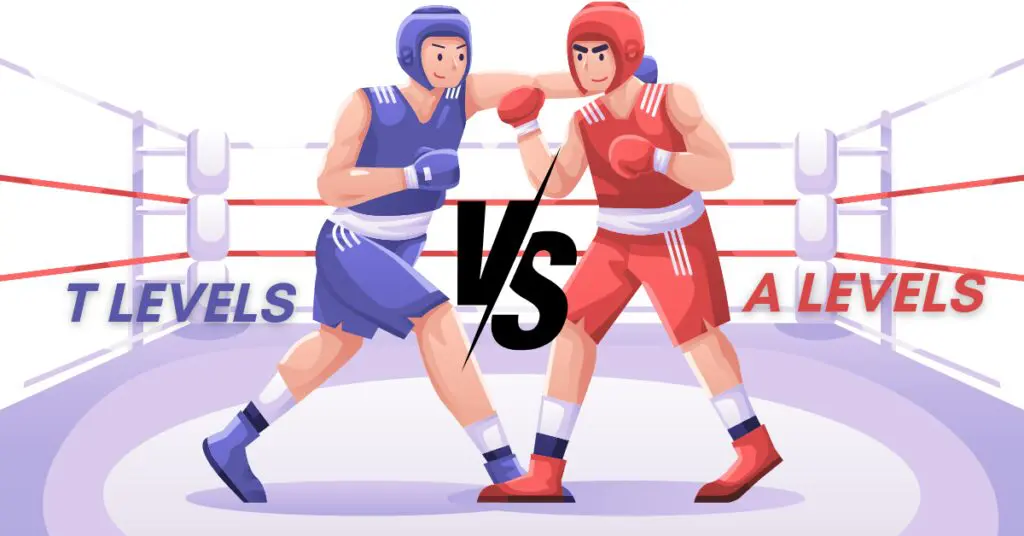If you are leaving school this year, you might be worried about the best next step to take in your education. Is it better to study for A levels, or should you choose T Levels courses? Which qualification will be a better fit for you and your future?
In our article below, we will look at everything you need to know about A Levels and T Levels. We will discover how the two qualifications are different and how they can help you progress in your chosen career path. So, before you make any important decisions, make sure to read all the essential info you need on T levels vs A levels below!
Once you’ve tackled mocks, revision and the GCSE exams, you’ll feel a surge of freedom. But you also know it’s time for the next phase in your life. This transition means you get a choice.
T Levels vs A levels – All the Essential Info
Before we delve into A Levels vs T Levels courses in detail, first we need to know exactly what each qualification is. So, here is a quick breakdown of the basics:
What are A levels?
A Levels are mainly classroom-based qualifications and focus on developing an academic understanding of a subject. These courses will help you progress in your higher education and career path but haven’t been designed as a step towards a specific job.
When you take A Levels, you will generally study between three or more subjects over a two-year period. At the end of the second year, you will take exams, which, along with coursework, will contribute towards your final grade.
What are T levels Qualifications?
T Levels qualifications are a newer educational option introduced by the government in 2020. These qualifications concentrate more on technical skills and provide a more job-centric alternative to more academic A Levels. When you opt for T Levels courses, you will generally study only one subject.
The courses have been created to help post-GCSE 16-18-year olds develop the knowledge and experience they need to build a career in their chosen field. During the two years it takes to get a T- Level qualification, your education will combine learning practical skills, hands-on experience, and classroom learning.
Currently, we offer two amazing T Level courses. Find out more about each one and how to enrol by clicking the relevant link below:
T Levels Vs A Levels: Which is the Best Fit For You?
Both A Levels and T Levels courses have been created to empower you with the skills and knowledge you need to move forward in your career or higher education. However, there are key differences that could make one option a better fit for you than the other. So, let’s take a look at the pros and cons of T-levels vs A-levels to help you decide.
Pros and Cons of T Levels
T Levels qualifications allow you to focus on one vocational subject and develop the skills and experience you need to begin a career in a specific industry. For this reason, T Levels can be an excellent choice if you already have a clear idea of what you are going to do. In addition to the information found on the official T Level page, here are some of the main benefits and drawbacks of T Levels:
Pros of T Levels
- Concentrate on a subject you are passionate about and start working towards your career development right away.
- Develop real-world skills and experience for your chosen career with at least 315 hours (45 days) in an industry placement.
- Learn by doing and gain practical skills on the job away from a classroom setting.
- T Levels courses are equivalent to three A- Level qualifications in UCAS points.
Cons of T Levels
- You need to narrow down your education to a specific job or industry.
- If you are planning to progress to university, A Levels may better prepare you for the academic process of getting a degree.
Who is a Good Fit for A Levels?
A Levels are classroom-based qualifications that allow you to study the academic and theoretical aspects of a subject. You can study three or more subjects, making this a good choice if you aren’t certain about your career or higher education path just yet. You can find out more information on the A Level Information Hub, but here are some of the pros and cons of studying for A Levels.
Pros of A Levels
- You can learn about three or more subjects at once, meaning you are not limited to one set career path right away.
- A Levels are highly valued by universities and employers in the UK and across the globe.
- Develop a deep theoretical and academic understanding of the subjects you are interested in.
- Discover which subjects you are most passionate about pursuing as a career.
Cons of A Levels
- You won’t be able to gain the hands-on vocational experience that T Levels offer.
- A Level marks are heavily weighted by a final exam assessment at the end of the two years.
Which is Harder? – T Levels or A Levels?
There is no clear answer to whether A Levels or T Levels courses are harder. Both qualifications will challenge you in different ways and require hard work. Whether you will find one harder than the other will depend on your personality, strengths, and how you enjoy working or studying.
If you find classroom-based theoretical work difficult or frustrating, then practical work-based T Level qualifications may be a better fit. However, T Levels will also require some classroom learning and assignments along with job-based tasks.
Can I Go To University with T Level Qualifications?
A T Level qualification will earn you the equivalent UCAS points of 3 A Levels. So, it is possible for you to build on your T Level qualification by going to university and studying a subject on a deeper level.
You can also use a T Levels qualifications as a base to begin your career at entry level, as these are highly valued vocational courses that employers and organisations will recognise.
Conclusion: T Levels vs A Levels – Which Is Right For Me?
Deciding between T Level and A Levels depends on various factors. When choosing the best post-GCSE qualification for you, you need to consider your learning style and the career path you want to follow.
A Levels will provide you with an academic understanding of several subjects, whereas T Levels courses enable you to narrow down your focus to one career or industry.
To decide on the best course for you, take another look at our pros and cons of T Levels vs A Levels above. And then think about which option best matches who you are and who you want to be.
If you are interested in T Levels qualifications, we are currently offering two exciting T Level courses at Central Training Academy. Click on the course links below for more information.






